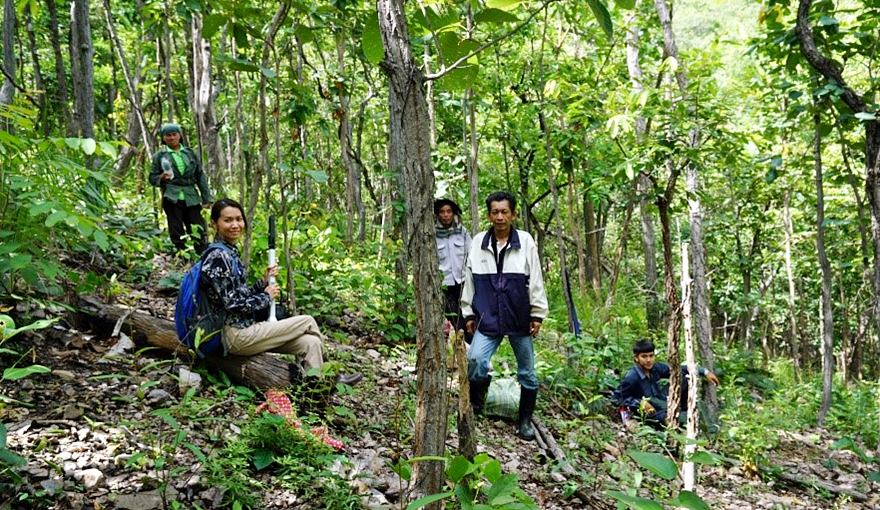 Ms. Siriluck Thammanu taking lead in the forest field survey.
Ms. Siriluck Thammanu taking lead in the forest field survey.
Non-Timber Forest Products (NTFP) provide support in terms of food, medicine, livelihood, and overall well-being to around 23 million people who live in national forest reserve areas in Thailand. There are more than 10,000 registered community forests in Thailand covering a total area of 904,540 hectares, and the Royal Forest Department allows local people to collect NTFP from their registered community forests. Recognizing the potential of NTFP, the Southeast Asian Regional Center for Graduate Study and Research in Agriculture (SEARCA), which manages the ASEAN Working Group on Social Forestry (AWG-SF) Strategic Response Fund [ASRF], supports the Royal Forest Department in addressing the research gaps in NTFP.
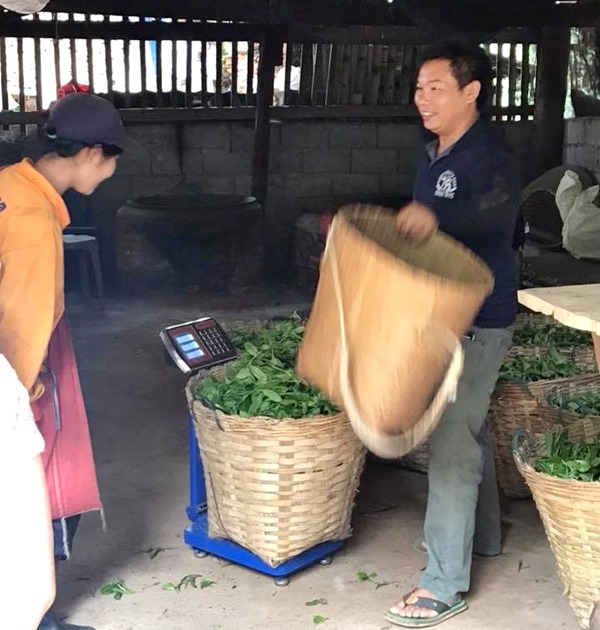 Villager selling tea leaves harvested from agro-forest in Mae Tha.The Royal Forest Department endorsed to SEARCA-ASRF the implementation of Kasetsart University's project, titled Assessing the Potential of Non-Timber Forest Products for Value Chain and Community Forestry Enterprises Development in Northern Thailand, which aims to collect and analyze information on NTFP to develop value chain, value addition, and community forest enterprises. The study is conducted in two forest communities, Hin Lad Nai and Mae Thai, located in northern Thailand. Community meetings were facilitated to identify NTFP species with highest potential for enterprise development. In Hin Lad Nai, bamboo shoot production was selected primarily because there are already a number of households engage in bamboo shoot collection, which has contributed to an increase in family income. In Mae Tha, honey bee and tea leaf production were selected because almost every household conduct beekeeping and own tea-based agroforestry plots. Data on selected NTFP species are being collected and analyzed. The project team will likewise conduct Net Present Value (NPV) and value chain analysis. Furthermore, training courses on technology and enterprise development at the local level will be conducted to improve capacity and knowledge of NTFP collectors. Dr. Surin Onprom, Faculty of Forestry, Kasetsart University, leads in implementing this project.
Villager selling tea leaves harvested from agro-forest in Mae Tha.The Royal Forest Department endorsed to SEARCA-ASRF the implementation of Kasetsart University's project, titled Assessing the Potential of Non-Timber Forest Products for Value Chain and Community Forestry Enterprises Development in Northern Thailand, which aims to collect and analyze information on NTFP to develop value chain, value addition, and community forest enterprises. The study is conducted in two forest communities, Hin Lad Nai and Mae Thai, located in northern Thailand. Community meetings were facilitated to identify NTFP species with highest potential for enterprise development. In Hin Lad Nai, bamboo shoot production was selected primarily because there are already a number of households engage in bamboo shoot collection, which has contributed to an increase in family income. In Mae Tha, honey bee and tea leaf production were selected because almost every household conduct beekeeping and own tea-based agroforestry plots. Data on selected NTFP species are being collected and analyzed. The project team will likewise conduct Net Present Value (NPV) and value chain analysis. Furthermore, training courses on technology and enterprise development at the local level will be conducted to improve capacity and knowledge of NTFP collectors. Dr. Surin Onprom, Faculty of Forestry, Kasetsart University, leads in implementing this project.
Similarly, the Royal Forest Department endorsed to SEARCA-ASRF the implementation of a study on the Sustainable Utilization of Non-Timber Forest Products in Community Forest for Rural Livelihood and Biodiversity Conservation in Thailand, conducted by Ms. Siriluck Thammanu, PhD candidate, Seoul National University, which aims to address concerns on biodiversity loss as a result of utilization of NTFPs and generate recommendations for appropriate harvesting level, which ensures rural livelihood improvement and biodiversity conservation. The study is conducted in one of the community forest in Mae Phrik, Lampang province in northern Thailand. Ms. Thammanu had conducted forest field survey from June to August 2018 to assess forest biodiversity of plants, mushrooms, small animals, and insects. A household survey questionnaire was also developed to determine the type of NTFP collected, their manner of utilization, market demand, value adding, households' perception and understanding of Community Forest Management processes, benefit sharing mechanisms, and enforcement of regulations, among others.
The results of these studies and recommendations will be presented to the Royal Forest Department for further development of community forest in Thailand. The output of these two projects will enable Thailand's leader and focal point on social forestry to contribute to the achievement of Thailand's national priorities and the Plan of Action of the AWG-SF 2016-2025.
ASRF, funded by the Swiss Agency for Development and Cooperation (SDC), aims to integrate social forestry into climate change adaptation and mitigation strategies of ASEAN and its member states. It promotes the inclusion of communities, women, and vulnerable groups in social forestry and climate change adaptation and mitigation measures.
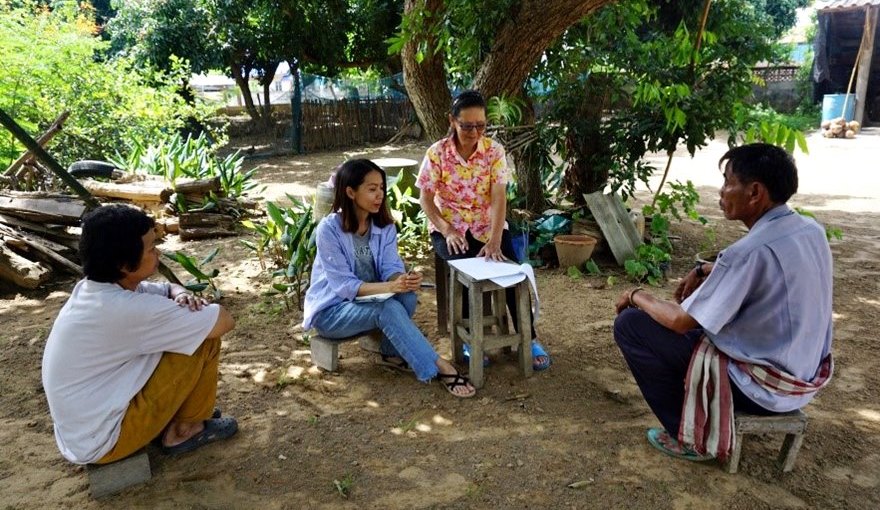 Interview of household member benefiting from the forest through NTFPs utilization.
Interview of household member benefiting from the forest through NTFPs utilization.
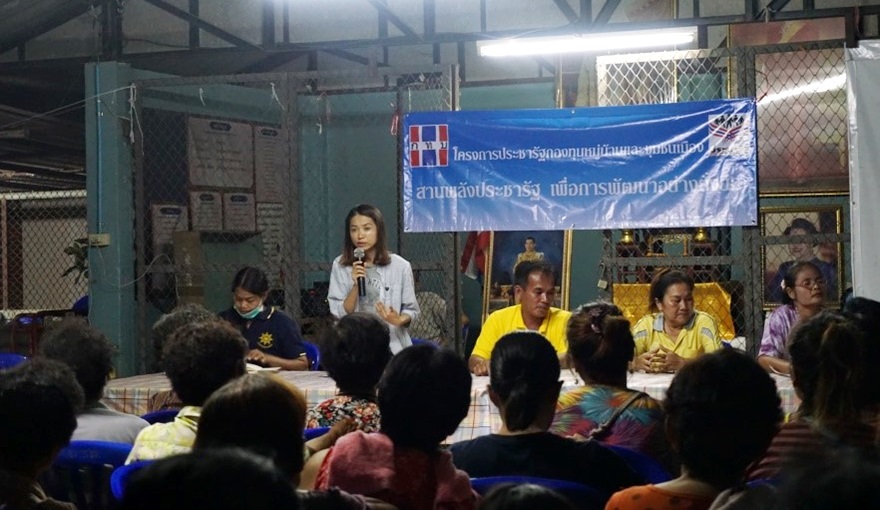 Ms. Siriluck Thammanu presenting the project to the community.
Ms. Siriluck Thammanu presenting the project to the community.
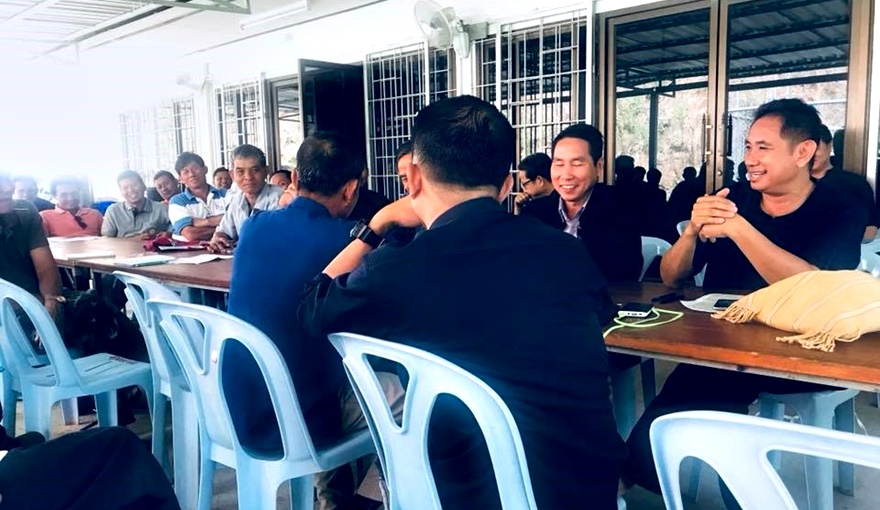 Consultation meeting in Mae Tha, Chiang Mai province to identify potential NTFP species.
Consultation meeting in Mae Tha, Chiang Mai province to identify potential NTFP species.













